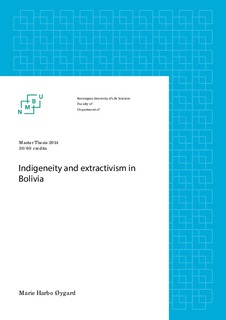| dc.description.abstract | This thesis explores the main challenges associated with the inclusion of indigenous peoples
in processes of natural resource extraction. With a predominant focus on the indigenous
population on the one hand, and state formation and natural resource governance on the other,
I argue that the Bolivian society is structured to include some peoples and exclude others.
My findings suggest that the Morales administration struggles to overcome enduring
structures of inequality that were created by colonialism – even under the current indigenous
discourse in which ‘ethnic politics’ has become “mainstream”. Therefore, unresolved tensions
persist – over what it means to be indigenous as well as over how to effectively include the
indigenous population in processes of natural resource extraction. Whilst the Bolivian state
has expanded the country’s extractive industries on the basis of economic necessity,
indigenous peoples in the country argue that their expansion conflicts with respect for Mother
Earth and the environment. As I discover through my field research, many indigenous
representatives and their supporters consider further capitalization of the economy and ‘ethnic
politics’ as incompatible. The state lacks institutional control in its hydrocarbon sector. This
has stimulated large-scale corruption that strengthens inequality amongst and between
indigenous peoples and the state, and fuels unequal power relations. Indeed, as I argue
drawing upon Karl (2007), the absence of a ‘fiscal social contract’ further weakens the state’s
legitimacy vis-à-vis its indigenous population. Whilst the role of indigenous peoples in
natural resource governance is formally strengthened through further constitutional support
for rights to prior consultation, the legal regulatory framework in which these right are
exercised, give rise to a set of unintended consequences. Poor procedural activity and lack of
due processes hampers indigenous peoples capacity to effectively participate in natural
resource governance. I therefore conclude that, despite formal advances in cultural
recognition and political representation, indigenous peoples’ participatory power and role in
natural resource governance is still severely limited. | nb_NO |
